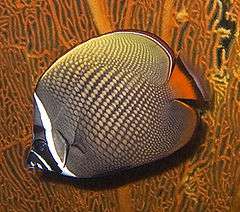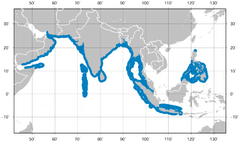Redtail butterflyfish
| Red-tailed butterflyfish | |
|---|---|
 | |
| Scientific classification | |
| Kingdom: | Animalia |
| Phylum: | Chordata |
| Class: | Actinopterygii |
| Order: | Perciformes |
| Family: | Chaetodontidae |
| Genus: | Chaetodon (but see text) |
| Subgenus: | Rabdophorus |
| Species: | C. collare |
| Binomial name | |
| Chaetodon collare Bloch, 1787 | |
 | |
| Redtail butterflyfish range.[1] | |
The red-tailed butterflyfish or redtail butterflyfish (Chaetodon collare), also known as the Pakistani butterflyfish, is a species of butterflyfish (family Chaetodontidae).
It can be found in reefs of the Indo-west Pacific region: from the Persian Gulf and Maldives to Japan, the Philippines and Indonesia. It usually swims at depths of between 3 and 15 m.[2]
It can grow to 18 cm (over 7 in) in length.[2] The red-tailed butterflyfish is brown to black, with lighter scales giving it a spotted appearance. It has a prominent, vertical white streak behind the eyes, a dark stripe over the eyes, and another, smaller white stripe in front of the eyes. The base of the tail is bright red, followed by a black stripe. The tip of the tail is diffuse white.[2]
In the wild, its diet consists of coral polyps. In captivity, it is a carnivore, taking fish meat and shrimp.[2]
Systematics

It belongs to the large subgenus Rabdophorus which might warrant recognition as a distinct genus. In this group, its relationships are doubtful; it seems related to the "raccoon-masked" group including the black butterflyfish (C. flavirostris), diagonal butterflyfish (C. fasciatus), Philippine butterflyfish (C. adiergastos) and the raccoon butterflyfish (C. lunula). Its color and pattern is entirely different from these, but it shares the robust habitus and bold habits.[3][4]
The mailed butterflyfish (C. reticulatus) is a near-match of C. collare in appearance, save for a less brown hue and light blue instead of red in its black-based tail. These two are widely sympatric in the western Pacific. But DNA sequence and osteology data overwhelmingly agree that C. reticulatus belongs to the subgenus called "Citharoedus" (a name preoccupied by a mollusc genus). This contains fish like the scrawled butterflyfish (C. meyeri), similar in shape and size but with a "finger-painted" pattern of a few prominent and uneven lines on light silvery background.[5][3][4]
If Rabdophorus were to be considered a distinct genus, "Citharoedus" would not be included in it but placed with the subgenera Lepidochaetodon or Megaprotodon. Thus, the red-tailed and mailed butterflyfishes probably represent a case of convergent evolution and perhaps mimicry. What selection forces were responsible for the striking similarity between two rather unrelated Chaetodon is not known.[3][4]
The highly anomalous 12S rRNA mtDNA sequence found in this species in one 2007 study seems to be due to a laboratory error; in another study a 12S rRNA sequence agreeing with the general pattern of mtDNA evolution in Rabdophorus was found.[3][4]
References
- ↑ International Union for Conservation of Nature (IUCN) 2010. Chaetodon collare. In: IUCN 2015. The IUCN Red List of Threatened Species. Version 2015.2. http://www.iucnredlist.org. Downloaded on 19 July 2015.
- 1 2 3 4 FishBase [2008]: Chaetodon collare. Retrieved 2008-SEP-01.
- 1 2 3 4 Fessler, Jennifer L. & Westneat, Mark W. (2007): Molecular phylogenetics of the butterflyfishes (Chaetodontidae): Taxonomy and biogeography of a global coral reef fish family. Mol. Phylogenet. Evol. 45(1): 50–68. doi:10.1016/j.ympev.2007.05.018 (HTML abstract)
- 1 2 3 4 Hsu, Kui-Ching; Chen, Jeng-Ping & Shao, Kwang-Tsao (2007): Molecular phylogeny of Chaetodon (Teleostei: Chaetodontidae) in the Indo-West Pacific: evolution in geminate species pairs and species groups. Raffles Bulletin of Zoology Supplement 14: 77-86. PDF fulltext
- ↑ Blum, S.D. (1988): Osteology and Phylogeny of the Chaetodontidae (Pisces: Perciformes). University of Hawaii, Honolulu.
| Wikimedia Commons has media related to Chaetodon collare. |
